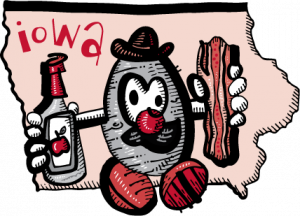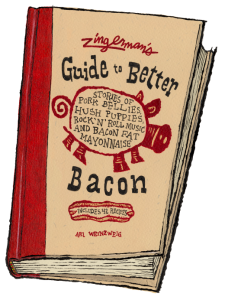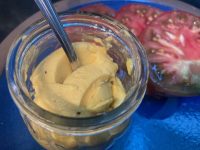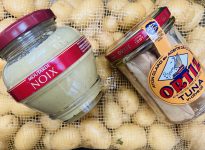Potato Salad from Iowa
Zingerman’s 4th Annual Camp Bacon is coming soon and to help get everyone prepared, we’re sharing tasty excerpts and recipes from Ari’s book, Zingerman’s Guide to Better Bacon.
Emma Dencklau’s Iowa German Potato Salad
This recipe first came up courtesy of historian and long-time Zingerman’s customer Leo Landis, whom I met many years ago when he was working at the Henry Ford Museum in Dearborn. Leo moved back to his native Iowa a few years ago, but we’ve continued to correspond: I asked for his help in preparing a special “Foods of Iowa” dinner at the Zingerman’s Roadhouse, and in return he shared many lovely little bits of Iowa history and culture, one of which was this great bacon-powered potato salad.
The Dencklau recipe dates to the early part of the twentieth century and probably goes back to older roots in Germany. Emma’s family arrived here from Germany at the turn of the last century. According to the 1920 census she was born in 1902 in Webster County, about 100 miles north of Des Moines. Today the trip is about an hour and a half by car, but back then it would have been roughly two days each way on horseback. Looking down the census page you can see how many families in the area were of German origin, so it’s not surprising that potato salads like this were and are very common. Leo got the recipe from the grandson of the woman to whom it’s credited, which means it’s basically third-generation American by this point.
The vinegar is a key ingredient, whose quality is integral to the flavor of the finished dish. As I’ve said many times, I’m very high on the cider vinegar we get from Pierre Gingras in Quebec. It’s made from hand-picked apples, no windfalls, no dregs, then aged for over two years in oak barrels. In this dish it adds that lively vinegar zip, but because Gingras’ is so well-made and its flavor so well-rounded, the flavor of the finished dish is lively without seeming overly sharp. Rather than using tap water I used the cooking water from the potatoes, both because the starch in the water helps binds the sauce and because it brings its own flavor to the salad.
Emma’s exact recipe is below. I used the Nueske’s applewood-smoked bacon, since its roots are—as were Emma’s—both German and Midwestern. I’ve kept the original, large quantities because they more accurately reflect the way dishes were cooked back in Emma’s day. All the ingredients are portioned in nice round numbers, so you can easily halve or quarter the amounts if you want.
I personally don’t love sweet salads, so I when I make this at home I add almost none of the sugar that Emma calls for. By contrast I probably put in a bit more freshly ground black pepper. Regardless, the finished salad is darned delicious—very rich, but lightened on the palate by the goodly dose of vinegar.
Ingredients:
- 4 pounds potatoes (I prefer Yukon Golds or German butterballs because they’re delicious and buttery in their own right, and also because they absorb the bacon fat so beautifully)
- 1 pound sliced Nueske’s or comparable bacon (about 8 to 12 slices)
- 1 large onion, coarsely chopped
- 2 tablespoons flour

- ½ cup cider vinegar
- 2 tablespoons sugar (optional)
Procedure:
- 1. Steam the potatoes in their skins over salted water for 30 minutes or until well-cooked and fork tender. Remove them from the heat and allow to cool, reserving 1¼ cups of the cooking water.
- 2. Fry the bacon over medium heat until nearly crisp but still bendable, then remove it from the pan and cut it into 1-inch pieces. Leave the fat in the pan.
- 3. Reduce heat to low and add the onion to the pan. Cook over low heat until soft, stirring occasionally.
- 4. Raise heat to medium. Sift the flour over the onions, then stir steadily for about 5 minutes to make a roux. The flour and fat should become well bound and very lightly brown in color.
- 5. Slowly add the cider vinegar to the roux, stirring steadily until the sauce thickens. Repeat with the potato water, again stirring constantly until the sauce is thickened. Add the sugar if you like and, again, mix well. Remove from the heat.
- 6. Cut the cooked potatoes into 1-inch cubes and add them to the sauce along with the bacon pieces. Mix gently, but well.
- 7. Serve immediately, while the salad is still warm. It also keeps well in the refrigerator—you can serve it the next day and it’s still quite good, either cold or reheated.
Serves 4 to 6 as a main course, or 8 as a side dish.





Zingerman’s Art for Sale